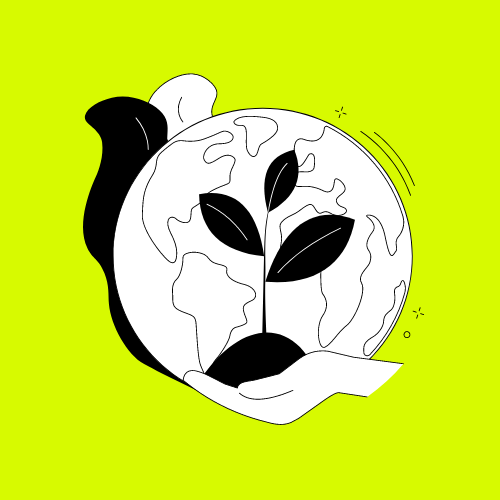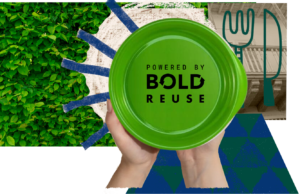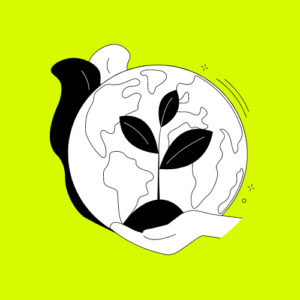Scotland is taking a bold step toward a more sustainable future with its recent introduction of the Circular Economy Bill.
In the summer of 2022, I spent several weeks in Edinburgh, Scotland studying urban sustainability and planning. Though the city itself boasts stunning medieval architecture and other centuries-old sights, its commitment to sustainability and environmental harm reduction is undeniably cutting-edge. Edinburgh is making great strides in urban sustainability from the vast public greens paces of Princes Street Gardens and the Water of Leith Walkway to unique waste stream diversion projects like Rhyze Mushrooms.
While researching international reuse policy efforts, Scotland’s recent Circular Economy Bill caught my eye. With the help of organizations like Zero Waste Scotland, country-wide initiatives for the transition to a circular economy are in motion– and the international community can certainly take inspiration. In this post, I’ll go over a few of the critical aspects of the legislation, and what we might learn from it here in the U.S.
Why Are EPR Laws Important?
The future of waste management and pollution prevention lies in reuse and the integration of reuse systems into vital economic activities. Though reuse programs and policies have been flourishing at the local level for years, national legislation continues to make exciting progress. Worldwide, circular economy bills and extended producer responsibility laws (EPR) are taking center stage, encouraging reuse for producers, consumers, and lawmakers.
In late July, representatives from the Ellen MacArthur Foundation spoke before the U.S. Senate Committee on Environment and Public Works. The foundation advocates for the transition to a circular economy across multiple sectors, recently focusing on the momentous opportunities for plastics in reuse systems. The testimony, titled “Solutions for Single-Use Waste: Expanding Refill and Reuse Infrastructure,” is an indication of the possible advances in the arena of U.S. reuse policy.
With this crucial development in mind– how might the progression to a circular economy in the U.S. develop? At this stage, it is helpful to look to other nations like France and Scotland that are already on their way.
Scotland's Circular Economy Bill
In June of 2023, the Scottish Parliament introduced a Circular Economy Bill. The legislation has now progressed to Stage 1 of its review by the Net Zero, Energy and Transport Committee.
Though the bill is still in its introductory phase, the sentiments and goals expressed outline essential environmental impact minimization strategies – with reuse playing a significant role. The Scottish Parliament acknowledges the importance of circular economy targets, highlighting their ability to drastically reduce waste and consumption in the face of the climate crisis. The bill will require Ministers of the Scottish Parliament to set targets for the progression towards a circular economy, among other direct measures addressing the country’s waste streams.
What Targets Are Set Within the Bill?
Targets have been set to help spur the initiatives of the bill into action. Below is a deep dive into those targets.
Charges on Suppliers of Single-use Items (e.g. coffee cups and other disposables)
- In 2014, Scotland introduced a 5p charge on single-use shopping bags that resulted in an 80% decrease in usage in a single year. In 2021, the amount was raised to a minimum of 10p. Based on success stories like these and a preliminary consultation, Scotland is optimistic that this circular economy initiative will be well-received and effective for consumers and businesses.
- Though not explicitly mentioned in the language of the bill, this initiative mirrors Extended Producer Responsibility (EPR) laws that have been passed on and introduced in several U.S. states and across the globe.
Targets for Local Recycling Efforts
- These will include efforts to modernize and improve efficiencies of current recycling systems. According to the Scottish Parliament’s website, these local targets will be modeled after Wales’ recycling system, which has one of the highest national household recycling rates in the world.
A Ban on the Disposal of Unused or Unsold Products
- Producers must now find alternative end of life solutions for unused goods, addressing the exorbitant volume of unused clothing and electronics found in landfill. The bill suggests reuse, donation, or recycling of these items instead.
- In 2021, France instituted a similar ban as part of their Anti-Waste and Circular Economy Law. The expansive restriction covers the disposal of cosmetic and hygiene products, clothes, electronics, and other unsold goods.
View the bill in its entirety or the Explanatory Notes here.
Where Is Reuse Mentioned in the Bill?
Scotland’s bill frequently mentions reuse, emphasizing the need for “society-wide” resource management and reuse in the transition to a circular economy. A key objective of the bill is the maximization of pre-existing reuse and recycling services. This includes incentivizing reuse at the household level, which would include implementing standardized definitions of practices, better communication with households, and more consistent policies in the interest of enhancing these services.
Also outlined is the possibility of mandatory public reporting for businesses of waste and surplus products with the goal of making waste streams and their impact more transparent. It is suggested that this initiative should start with businesses or industries with the highest potential for reuse.
Special attention is paid to the local authority level, reaffirming the impact and importance of smaller-scale reuse. Small-scale, local reuse is also championed in a January 2023 article from Upstream summarizing the importance of local reuse policy in the United States.
Efforts Towards A Circular Economy In the U.S.
Organizations like the Ellen MacArthur Foundation are making tremendous strides in drawing attention to the power of reuse, though there is currently little in the way of federal legislation supporting a nationwide transition to a circular economy.
However, individual states, counties, and municipalities around the country have already taken important steps in waste and pollution prevention that should be celebrated.
Oregon, Maine, Colorado, and California have all recently introduced various EPR laws, many of which directly limit or ban single-use packaging. In Oregon, the 2021 Plastic Pollution and Recycling Modernization Act requires the creation and funding of recycling alternatives, with reuse explicitly named among them.
What Can the U.S. Take Away From Scotland’s Circular Economy Bill?
Standardization and Education
The standardization of reuse systems, education, and access to information for producers and consumers alike are all essential steps to scaling up reuse practices in the United States. The benefits of standardization and the necessity of industry-wide standards in scaling reuse systems were discussed in our August 2023 webinar with Resolve/PR3. An overview of the webinar can be found here.
Numbers are Key
The aggregation of data from current reuse policies and projects would be incredibly beneficial in supporting nationwide legislation and making the demonstrable impacts of reuse more visible to lawmakers and the general public. California, Connecticut, Delaware, Hawaii, Maine, New York, Oregon, and Vermont have all introduced progressive policies banning the sale of plastic bags, with some even implementing fees on paper bags in retail settings. The impacts of these programs are significant, and further visibility and reporting on their significance is crucial to ramping up efforts at the federal level.
The momentum being built around the Circular Economy is promising and I’m sure we can expect more countries and governments to follow Scotland’s lead in the years to come.
If you’re new to the Circular Economy or just want to stay up to date with all the latest news, check out our Resources Page.




